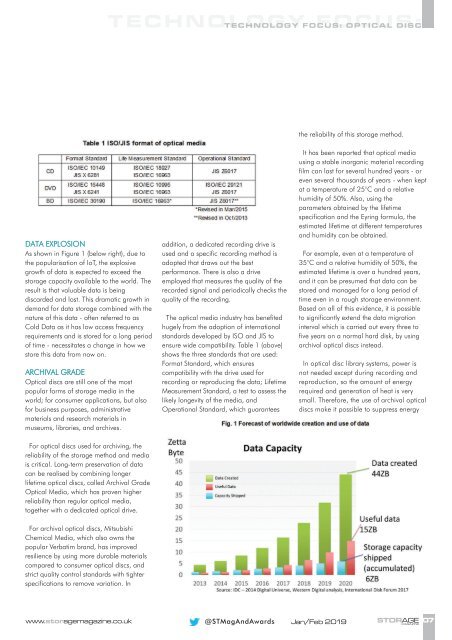ST1901
Create successful ePaper yourself
Turn your PDF publications into a flip-book with our unique Google optimized e-Paper software.
TECHNOLOGY FOCUS: OPTICAL DISC<br />
the reliability of this storage method.<br />
DATA EXPLOSION<br />
As shown in Figure 1 (below right), due to<br />
the popularisation of IoT, the explosive<br />
growth of data is expected to exceed the<br />
storage capacity available to the world. The<br />
result is that valuable data is being<br />
discarded and lost. This dramatic growth in<br />
demand for data storage combined with the<br />
nature of this data - often referred to as<br />
Cold Data as it has low access frequency<br />
requirements and is stored for a long period<br />
of time - necessitates a change in how we<br />
store this data from now on.<br />
ARCHIVAL GRADE<br />
Optical discs are still one of the most<br />
popular forms of storage media in the<br />
world; for consumer applications, but also<br />
for business purposes, administrative<br />
materials and research materials in<br />
museums, libraries, and archives.<br />
For optical discs used for archiving, the<br />
reliability of the storage method and media<br />
is critical. Long-term preservation of data<br />
can be realised by combining longer<br />
lifetime optical discs, called Archival Grade<br />
Optical Media, which has proven higher<br />
reliability than regular optical media,<br />
together with a dedicated optical drive.<br />
addition, a dedicated recording drive is<br />
used and a specific recording method is<br />
adopted that draws out the best<br />
performance. There is also a drive<br />
employed that measures the quality of the<br />
recorded signal and periodically checks the<br />
quality of the recording.<br />
The optical media industry has benefited<br />
hugely from the adoption of international<br />
standards developed by ISO and JIS to<br />
ensure wide compatibility. Table 1 (above)<br />
shows the three standards that are used:<br />
Format Standard, which ensures<br />
compatibility with the drive used for<br />
recording or reproducing the data; Lifetime<br />
Measurement Standard, a test to assess the<br />
likely longevity of the media, and<br />
Operational Standard, which guarantees<br />
It has been reported that optical media<br />
using a stable inorganic material recording<br />
film can last for several hundred years - or<br />
even several thousands of years - when kept<br />
at a temperature of 25°C and a relative<br />
humidity of 50%. Also, using the<br />
parameters obtained by the lifetime<br />
specification and the Eyring formula, the<br />
estimated lifetime at different temperatures<br />
and humidity can be obtained.<br />
For example, even at a temperature of<br />
35°C and a relative humidity of 50%, the<br />
estimated lifetime is over a hundred years,<br />
and it can be presumed that data can be<br />
stored and managed for a long period of<br />
time even in a rough storage environment.<br />
Based on all of this evidence, it is possible<br />
to significantly extend the data migration<br />
interval which is carried out every three to<br />
five years on a normal hard disk, by using<br />
archival optical discs instead.<br />
In optical disc library systems, power is<br />
not needed except during recording and<br />
reproduction, so the amount of energy<br />
required and generation of heat is very<br />
small. Therefore, the use of archival optical<br />
discs make it possible to suppress energy<br />
For archival optical discs, Mitsubishi<br />
Chemical Media, which also owns the<br />
popular Verbatim brand, has improved<br />
resilience by using more durable materials<br />
compared to consumer optical discs, and<br />
strict quality control standards with tighter<br />
specifications to remove variation. In<br />
www.storagemagazine.co.uk<br />
@STMagAndAwards<br />
Jan/Feb 2019<br />
STORAGE<br />
MAGAZINE<br />
07

















